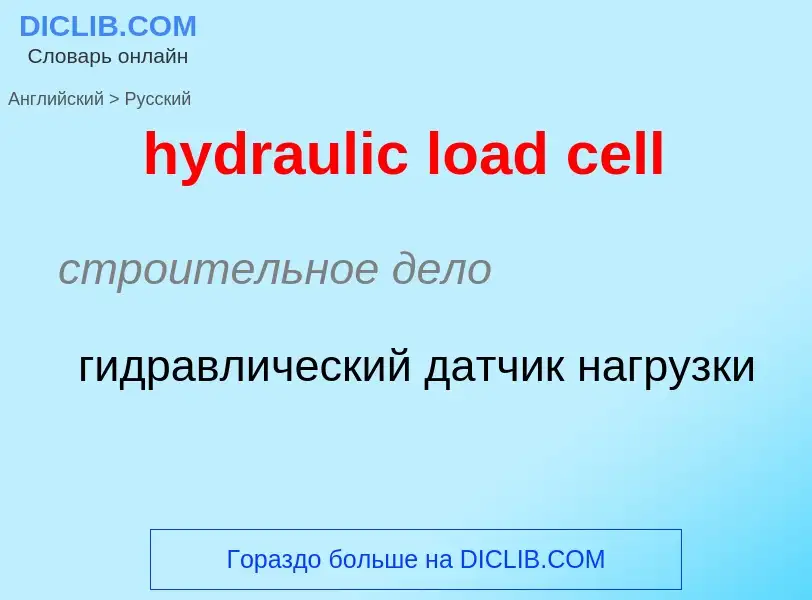Μετάφραση και ανάλυση λέξεων από την τεχνητή νοημοσύνη ChatGPT
Σε αυτήν τη σελίδα μπορείτε να λάβετε μια λεπτομερή ανάλυση μιας λέξης ή μιας φράσης, η οποία δημιουργήθηκε χρησιμοποιώντας το ChatGPT, την καλύτερη τεχνολογία τεχνητής νοημοσύνης μέχρι σήμερα:
- πώς χρησιμοποιείται η λέξη
- συχνότητα χρήσης
- χρησιμοποιείται πιο συχνά στον προφορικό ή γραπτό λόγο
- επιλογές μετάφρασης λέξεων
- παραδείγματα χρήσης (πολλές φράσεις με μετάφραση)
- ετυμολογία
hydraulic load cell - translation to ρωσικά
строительное дело
гидравлический датчик нагрузки
строительное дело
гидравлическое оборудование
Βικιπαίδεια
In hydraulic systems, a fuse (or velocity fuse) is a component which prevents the sudden loss of hydraulic fluid pressure. It is a safety feature, designed to allow systems to continue operating, or at least to not fail catastrophically, in the event of a system breach. It does this by stopping or greatly restricting the flow of hydraulic fluid through the fuse if the flow exceeds a threshold.
The term "fuse" is used here in analogy with electrical fuses which perform a similar function.
Hydraulic systems rely on high pressures (usually over 7000 kPa) to work properly. If a hydraulic system loses fluid pressure, such as due to a burst hydraulic hose, it will become inoperative and components such as actuators may collapse. This is an undesirable condition in life-critical systems such as aircraft or heavy machinery, such as forklifts. Hydraulic fuses help guard against catastrophic failure of a hydraulic system by automatically isolating the defective branch.
When a hydraulic system is damaged, there is generally a rapid flow of hydraulic fluid towards the breach. Most hydraulic fuses detect this flow and seal themselves (or restrict flow) if the flow exceeds a predetermined limit. There are many different fuse designs but most involve a passive spring-controlled mechanism which closes when the pressure differential across the fuse becomes excessive.
Many gas station pumps are equipped with a velocity fuse to limit gasoline flow. The fuse can be heard to engage with a "click" on some pumps if the nozzle trigger is depressed fully. A slight reduction in fuel flow can be observed. The fuse resets instantly upon releasing the trigger.


![An [[excavator]]; main hydraulics: Boom cylinders, swing drive, cooler fan, and trackdrive An [[excavator]]; main hydraulics: Boom cylinders, swing drive, cooler fan, and trackdrive](https://commons.wikimedia.org/wiki/Special:FilePath/CAT385-Raupenbagger.jpg?width=200)


![scissor lift]] scissor lift]]](https://commons.wikimedia.org/wiki/Special:FilePath/Hydraulic control pad with valves.jpg?width=200)
